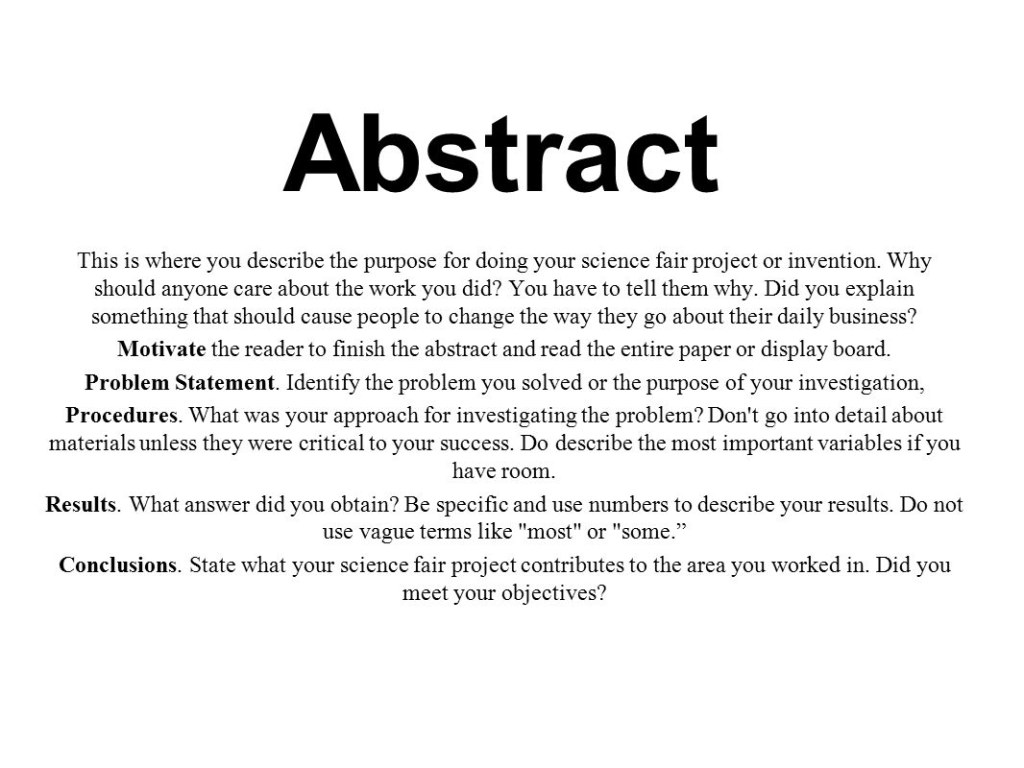Unlock The Secrets: What Is An Abstract For A Science Project? Discover The Power Of A Compelling Abstract Now!
What is an Abstract for a Science Project?
Introduction
Smart Readers, welcome to this informative article that aims to provide you with a comprehensive understanding of what an abstract for a science project is. In the world of scientific research, an abstract plays a crucial role in summarizing the key aspects of a project. It serves as a concise overview that allows readers to quickly grasp the purpose, methods, and results of a study. In this article, we will explore the importance, components, and tips for writing an effective abstract for a science project.
2 Picture Gallery: Unlock The Secrets: What Is An Abstract For A Science Project? Discover The Power Of A Compelling Abstract Now!


1. What is an Abstract?
An abstract is a brief summary of a scientific project, research paper, or experiment. It condenses the main points of the study into a concise paragraph, providing readers with a snapshot of the entire project without having to read the entire paper. A well-written abstract should capture the essence of the project, highlighting its objectives, methods, results, and conclusions.
2. Who Uses Abstracts?

Image Source: slideplayer.com
Abstracts are commonly used in the scientific community by researchers, scientists, and scholars. They are often included in scholarly journals, conference proceedings, and research databases. Abstracts also serve as a means for researchers to communicate their findings to a wider audience, allowing others to understand the essence of the study without needing to access the full paper.
3. When is an Abstract Needed?
An abstract is typically required when submitting a research paper to a journal, conference, or academic institution. It is commonly found at the beginning of a paper, providing readers with an overview of the study before delving into the details. In addition, abstracts are also used for literature reviews, grant proposals, and academic presentations.
4. Where is an Abstract Located?

Image Source: slideplayer.com
An abstract is usually located at the beginning of a research paper, immediately following the title and author information. In online databases or search engines, abstracts are often displayed alongside the title and author, allowing readers to quickly assess the relevance of the study to their own research.
5. Why is an Abstract Important?
The importance of an abstract lies in its ability to provide a concise summary of a study. It allows readers to quickly determine the relevance and significance of the research without having to read the entire paper. Abstracts also play a crucial role in helping researchers decide whether a study aligns with their own research interests and contributes to the existing body of knowledge.
6. How to Write an Effective Abstract?
Writing an effective abstract requires careful consideration of the key elements that should be included. The following tips can help you craft an abstract that captures the essence of your science project:
Start with a clear and concise statement of the research objective.
Describe the methods and techniques used in the study.
Summarize the main findings and results obtained.
Highlight the significance and implications of the research.
Keep the abstract within the recommended word limit.
Ensure the abstract is well-structured and organized.
Proofread and edit the abstract for clarity and accuracy.
Advantages and Disadvantages of Abstracts
Advantages
1. Time-Saving: Abstracts allow researchers to quickly assess the relevance of a study without investing significant time in reading the entire paper.
2. Accessibility: Abstracts are readily available in databases and online platforms, making it easier for researchers to access a wide range of studies.
3. Research Selection: Abstracts help researchers filter and select studies that align with their own research interests and goals.
Disadvantages
1. Limited Information: Abstracts provide a condensed version of the study, limiting the depth and detail of the information provided.
2. Potential Bias: Abstracts may not always accurately represent the full scope and findings of a study, potentially leading to biased interpretations.
3. Lack of Context: Abstracts often lack the necessary context and background information, making it challenging to fully understand the study without accessing the full paper.
Frequently Asked Questions (FAQs)
1. Can an abstract be longer than one paragraph?
No, an abstract is typically limited to a single paragraph, ranging from 150 to 250 words, depending on the specific guidelines provided.
2. Should I include references in my abstract?
No, references are generally not included in abstracts. The focus should be on summarizing the key aspects of the study rather than providing a comprehensive literature review.
3. Do abstracts always follow a specific structure?
While there is no strict rule regarding the structure of abstracts, they generally include sections on the research objective, methods, results, and conclusions.
4. Can I write the abstract before completing the research?
Yes, it is common to write the abstract before completing the research as it helps in defining the scope and objectives of the study. However, it may require revisions once the research is completed.
5. Is it necessary to include keywords in the abstract?
Including relevant keywords in the abstract helps in improving the discoverability of the study in online databases and search engines.
Conclusion
In conclusion, understanding what an abstract is and how to write an effective one is crucial for researchers and scientists. By providing a concise summary of a science project, abstracts enable researchers to communicate their findings, attract readers, and contribute to the overall advancement of scientific knowledge. Remember to carefully consider the key elements of an abstract and follow the recommended guidelines to ensure your abstract effectively represents your research. Best of luck with your science projects!
Final Remarks
Smart Readers, we hope this article has shed light on the importance and purpose of an abstract for a science project. As you embark on your own scientific endeavors, remember that an abstract serves as a vital tool for sharing your research with the scientific community. However, it is essential to carefully craft your abstract and ensure it accurately reflects the key aspects of your study. Keep in mind the tips and guidelines provided in this article, and may your abstracts contribute to the advancement of scientific knowledge. Happy researching!
This post topic: Abstract



